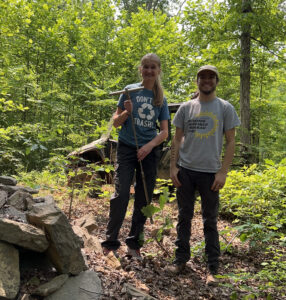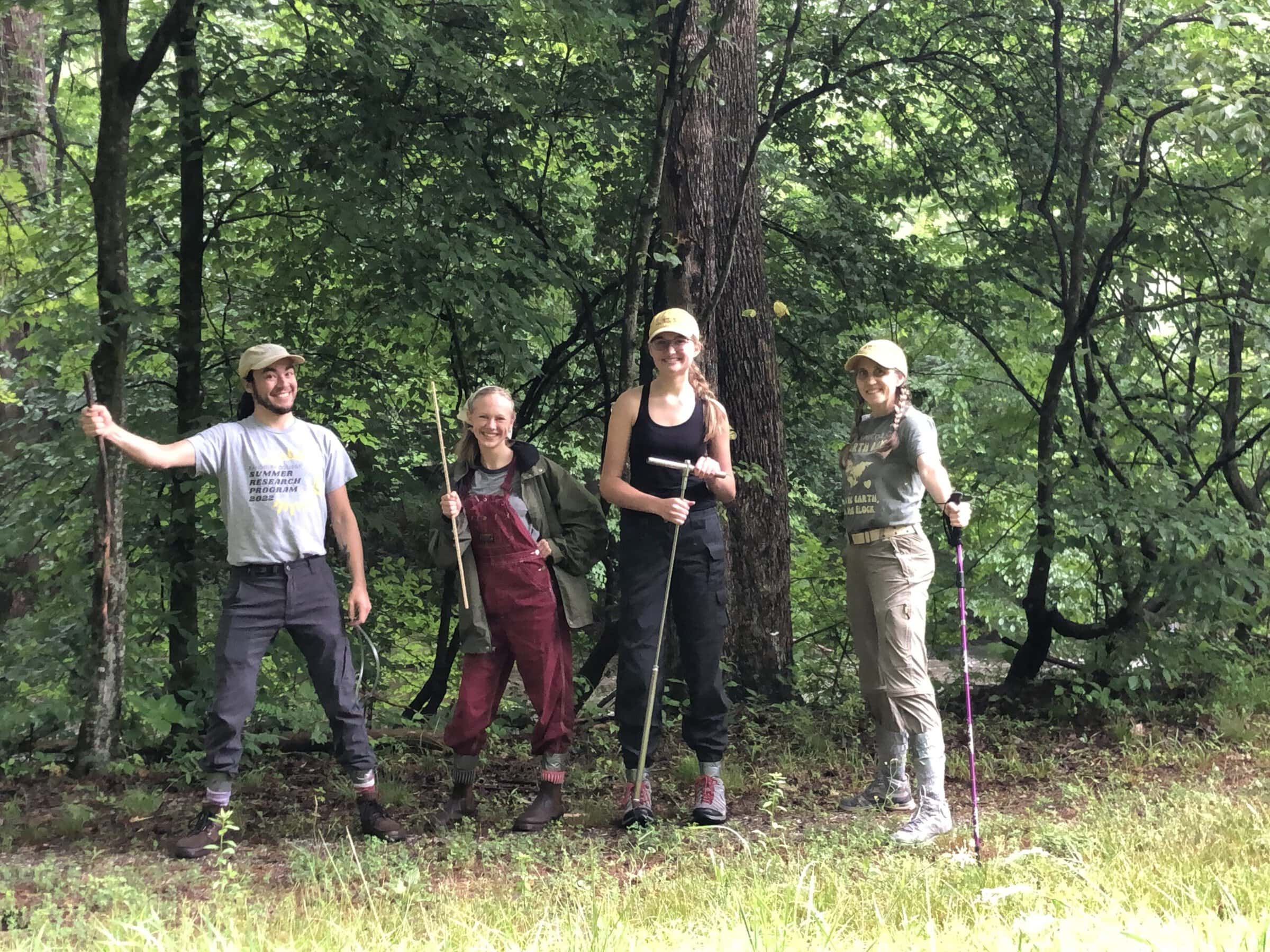Randolph grad takes on new role, continues ongoing research project with the 500-Year Forest Foundation

Trinity Shirlen ’26 and Gabe Quintero ’23 are working together in the field this summer.
Over the past two summers, Gabe Quintero ’23 bushwhacked his way through stinging nettle and trudged through grass taller than him for the 500-Year Forest Foundation.
He’s back in the forest this summer for more work with the organization. The national nonprofit works to preserve old growth forests, which provide vital ecosystem services, promote biodiversity, and store carbon, which helps reduce the effects of climate change.
Quintero is working this month as a field supervisor on a project that continues research the College has done with the foundation since 2019.
“This is implementing the work I did for my honors thesis in combination with what we’ve done over the past couple of years,” said Quintero, who will start a part-time job with the organization in July as a forest coordinator working on assessments and easements and supervising interns.
The collaboration between Randolph and the 500-Year Forest Foundation began in 2019, not long after Karin Warren, the College’s Herzog Family Professor of Environmental Studies and Science, joined its board.
The organization didn’t have its own staff to conduct field research, so she began recruiting students in what became a yearly Summer Research project and semester-long internships.
This summer, the foundation is providing funding to pay Quintero and undergraduate research assistant Trinity Shirlen ’26, as well as field assistant Wednesday Hertzberg ’26.

From left to right, Gabe Quintero ’23, Wednesday Hertzberg ’26, Trinity Shirlen ’26, and professor Karin Warren doing research for the 500-Year Forest Foundation.
They’re comparing methods Quintero developed for his honors research to estimate the amount of carbon that is stored in the soils of the forests. This data can give researchers a better idea of the role these areas play in climate mitigation. It will also eventually help forest owners take advantage of carbon credits.
“It’s definitely been a transition, going from the research side of things to managing the project,” said Quintero, who majored in environmental science and wants to eventually go to grad school to study forest or land management. “It’s nice to put it all together after the spring.”
While Quintero is at the beginning of his post-grad journey, Shirlen is just getting her feet wet as a research assistant.
“I don’t know exactly what I want to do, but I’m interested in state park, conservation, or forestry work,” she said. “This will really help me figure out what I want to do.”
They’re assessing three forests this summer, collecting samples to analyze back in the analytic chemistry lab.
“This is a project with a lot of moving parts,” Warren said. “It’s a real soup-to-nuts skill set. You have to be good about juggling lots of things. It’s not just the field work. There’s a research element to it, as well, looking at how we can monitor these forests to help keep track of their progress toward mature and old growth characteristics.”
Old growth forests have developed over a long period of time without significant disturbance and often include unique ecological features and large, old trees.
There isn’t much old growth in the United States, and that’s where the 500-Year Forest Foundation comes in.
“We’re trying to do stewardship and conservation so that, over time, they’ll develop mature forest and eventually old growth forest characteristics,” Warren said. “That’s where the foundation’s name comes from. We’re not there yet. We hope to be in the future.”
The work Randolph students have done over the years, in combination with Quintero’s thesis, helped make a case for his new position.
“It’s wonderful to see the trajectory he is on, evolving in his knowledge and skills,” Warren said of Quintero, whom she’s been training on how to be a project manager and research mentor in preparation for his new role as forest coordinator. “He’s also garnered the respect of everyone on the board because of the good work he’s done.”
If the job continues beyond the summer, Warren and Quintero hope he will continue to supervise Randolph student interns.
“It’s a really nice partnership that’s taken years to build up,” she said. “It’s the sort of thing I’d like to see exist even if I wasn’t on the board. It’s a way to train students in conservation research as well as careers of the future.”
Tags: environmental science, environmental studies, outcomes, student research, summer research
